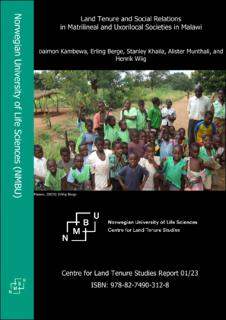| dc.contributor.author | Kambewa, Daimon | |
| dc.contributor.author | Berge, Erling | |
| dc.contributor.author | Khaila, Stanley | |
| dc.contributor.author | Munthali, Alister | |
| dc.contributor.author | Wiig, Henrik | |
| dc.coverage.spatial | Malawi | en_US |
| dc.date.accessioned | 2023-03-10T12:34:45Z | |
| dc.date.available | 2023-03-10T12:34:45Z | |
| dc.date.issued | 2023-03 | |
| dc.identifier.isbn | 978-82-7490-312-8 | |
| dc.identifier.uri | https://hdl.handle.net/11250/3057702 | |
| dc.description | The present paper is a revision of a paper that was submitted to Land Use Policy in 2009. The review from LUP from 2010 asked for a rewrite. Due to personal reasons this was not possible before other tasks took all available time. In connection with the lead authors work on an assessment of the fit of the Customary Land Act 2016 and its Amendments 2022 with rural lives and customary land management in Malawi, the discussion in the present paper was necessary as background. Hence we have updated the paper and present it as a report from the Centre for Land Tenure Studies at the Norwegian University of Life Sciences.
Erling Berge, Ås, March 2023 | en_US |
| dc.description.abstract | This paper is about social relations in customary lands for the matrilineal uxorilocal culture of the Lomwe, Nyanja and Yao tribes in Southern Malawi. The study was carried out in the districts of Chiradzulu and Phalombe. Qualitative methods were used to examine local histories and practices to identify the social and power relations between males and females in matrilineal groups and the roles of chiefs, extended families, and traditional practices in access to and control over customary land. By focusing on local histories the study documents that patterns of access to and control over customary lands are historical in nature and embedded in social ties and power relations. Male and female members of the household or family have equal use rights but unequal ownership rights. The land belongs to the extended family and not to the community or individuals. Instead of saying the land belongs to ‘me’ the people say the land belongs to ‘us’ even though the individuals may have user rights in perpetuity. The ‘us’ implies the extended family and not the community. The power and control over the land is located in the group of sisters and not in the head of family (mwini-mbumba) or the Chief. The patterns of control have to be understood for proper decisions to be made on how to organize access to and control over land, especially in a country where livelihoods are dependent on agriculture or are land based in nature. | en_US |
| dc.description.abstract | Denne artikkelen handlar om dei sosiale relasjonane i tradisjonelle jordbruksområde innan den matrilineale og uxorilokale kulturen hos Lomwe, Nyanja og Yao stammene i det sørlege Malawi. Studien vart gjort i distrikta Chiradzulu og Phalombe. Det vart nytta kvalitative metodar for å studere lokalhistorie og praksisar for å identifisere sosial- og makt-relasjonar mellom menn og kvinner i matrilineale grupper og kva roller høvdingar, stor-familiar og tradisjonelle praksisar har for tilgang til og kontroll over tradisjonelle jordbruksområde. Ved å fokusere på lokalhistorie dokumenterer studien at mønsteret i tilgang til og kontroll over tradisjonelle jordbruksområde er historisk i utgangspunktet og innbakt i sosiale band og makt relasjonar. Mannlege og kvinnelege medlemmer i hushaldet eller stor-familien har dei same bruksrettane, men ulike eigarrettar. Jorda tilhøyrer stor-familien og ikkje lokalsamfunnet eller individa. I staden for å seie at jorda tilhøyrer «meg» seier folk at jorda tilhøyrer «oss» sjølv om individet kan ha bruksrettar for all æve. «Oss» tyder stor-familien og ikkje lokalsamfunnet. Makt og kontroll over jorda er lokalisert i gruppa av søstrer og ikkje i sjefen for stor-familien (mwini-mbumba) eller høvdingen. Dette mønsteret for kontroll må ein skjøne for å kunne ta skikkelege avgjerder om korleis ein kan organisere tilgang til og kontroll over jorda, særleg i eit land der levebrødet er avhengig av jordbruk eller er grunnleggande arealbasert.
[uxorilokal (= matrilokal) tyder at personane er busett på kvinna sin heimstad; matrilineal tyder at ein reknar slektslinjer gjennom mødrer; høvdingar og mwini-mumba-er kan like gjerne vere menn som kvinner; familie tyder stor-familien av mødrer, tanter, søstrer, søskenbarn, osv; menn har sjølvsagt sin plass i storfamilien, men dei er ikkje jordeigarar] | en_US |
| dc.publisher | Norwegian University of Life Sciences, Ås | en_US |
| dc.relation.ispartofseries | CLTS Report;1/23 | |
| dc.rights | Attribution-NonCommercial-NoDerivatives 4.0 Internasjonal | * |
| dc.rights.uri | http://creativecommons.org/licenses/by-nc-nd/4.0/deed.no | * |
| dc.subject | Matrilineal | en_US |
| dc.subject | Matrilocal | en_US |
| dc.subject | Uxorilocal | en_US |
| dc.subject | Land tenure | en_US |
| dc.subject | Access rights | en_US |
| dc.subject | Use rights | en_US |
| dc.subject | Ownership rights | en_US |
| dc.subject | Yao | en_US |
| dc.subject | Lomwe | en_US |
| dc.subject | Nyanja | en_US |
| dc.subject | Malawi | en_US |
| dc.title | Land Tenure and Social Relations in Matrilineal and Uxorilocal Societies in Malawi | en_US |
| dc.type | Report | en_US |
| dc.source.pagenumber | 22 | en_US |

